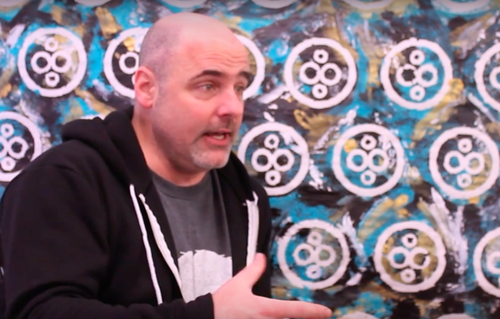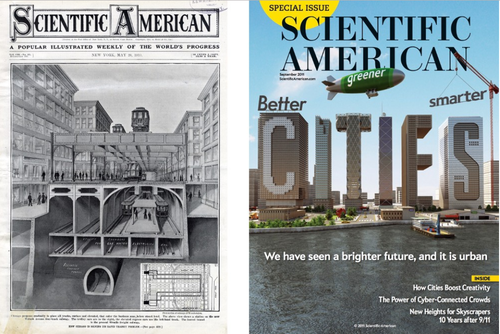

Among the early adopters of BuiltWorlds’ collaborative mission, tech thought leader John Tolva has long been one of our more passionate advocates and friendly encouragers since we launched in mid-2014.
A 13-year veteran of IBM Corp. before becoming the City of Chicago’s first-ever chief technology officer in 2011, Tolva was recognized by the White House in 2012 as a “Champion of Change”. So he was well aware of the public and private hurdles that existed for tech innovation when he presented here in late 2014 at Big Idea: Experience Big Data, one of our first major events. Then president of PositivEnergy Practice, an urban systems engineering firm focused on data-driven decision-making for sustainable design, Tolva would return to BW just three months later to serve as a judge for Chicago’s first-ever AEC Hackathon.
“BuiltWorlds, to me, is continuing the legacy of design excellence in the built environment,” said Tolva, speaking in March 2015. As a new voice, he said, we had the unique opportunity, to help our industry to evolve, “to get on board with data analytics and smart design, and to marry those two.”
Since then, Tolva has served as an advisor for the launch of our still-ongoing SmartWorlds educational initiative, which seeks to promote best practices across all disciplines in infrastructure markets vital to growing cities. Toward that end, he left Chicago for Denver last summer to co-found CityFi, a high-powered advisory firm dedicated to smart change and responsible urbanism. It targets cities, corporations, foundations, and start-ups, all looking to “make sense of our urbanizing world.”
We caught up with John last week, via phone and e-mail, to find out more about CityFi.
BW: John, good to speak with you again, sir. First off, though, why Denver?
John Tolva (JT): To be honest, we moved from Chicago for my wife’s job. She had an incredible career opportunity here and, frankly, it was my turn to make some sacrifices after years of her doing the same for me. But Denver is a very cool place to be right now. And all the telecom firms seem to have their operations based out here in Colorado now, regardless of where their headquarters are. And CityFi’s other two co-founders, Gabe Klein and Ashley Hand, live in Washington DC and Los Angeles, respectively, so we already knew that we didn’t need to be in the same city.
BW: Now, Klein had been transportation commissioner in both Chicago and Washington, while Hand was most recently transportation technology strategist for the City of Los Angeles and before that, chief innovation officer for Kansas City MO. What brought you three together?
JT: Well, we had all known each other for awhile. Talking with Gabe and Lois, we soon realized that in our separate parts of the country, we had all been seeing more requests for smart grid technology from local governments. Now, the term “smart cities” may have lost some of its luster in recent years, but the idea had not gone away. It’s no longer seen as just a technology play now. On the contrary, gauging by the interest we saw out there, it seemed like this was just the tip of the iceberg.
- Below, a new TEDx Talk from CityFi co-founder Gabe Klein, released January 10.
BW: So, what exactly is CityFi offering, and to whom?
JT: We are a pure consultancy firm, for campuses, companies, nonprofits, districts, cities, themselves. For the first time in my life, I’m not writing code for someone! Instead, we have assembled a national team, a network of professionals who have implemented policies and projects at senior levels in government, foundations, and the private sector. Our people have proven records of success delivering sustainable, significant, and systemic change in the way cities work for their citizens and enhance the civic experience. CityFi believes great cities come not from big projects but from carefully-designed underlying conditions — street grids, fair housing policies, business-friendly regulation — so that benefits build on each other. This is how our most resilient, productive cities have grown for a very long time…
BW: Would you say then that this is an extension of the ‘smart city’ movement?
JT: Yes, and no. As I said, in the past, that term has just implied new technologies tied to individual systems and projects. But early smart city efforts focused almost solely on optimizing the physical city without much thought for the actual human beings living there. Today, the hype is gone, and the early players have moved on. We have almost a decade’s worth of examples of what works and what doesn’t. The imperative to make our cities more livable and sustainable has never been greater.

BW: So how has your reception in the market been so far?
JT: It’s been very busy, which is great. We already have worked on international projects, from the Far East to Eastern Europe. Our pipeline will only only continue to grow, we think. In fact, I can’t divulge exactly which U.S. city it is, but one of the finalists in last year’s U.S. Dept. of Transportation Smart City Challenge has retained us to help them implement their plan. A growing part of our business is in the private sector, too, but we see real opportunity ahead with mid-size cities. They are just more nimble than the larger ones, and can implement change more quickly and easily. Locally, in fact, the mayor of Aspen CO is even one of our board members.
BW: Speaking of Colorado, are you involved with the new Panasonic Smart City that the company and the City of Denver just unveiled at the Consumer Electronics Show (CES) in Las Vegas?
JT: Not yet, but we definitely hope to meet with Panasonic soon. So it is on our radar for 2017. That is a very interesting project because it encourages major greenfield development between the airport and downtown, which are about 25 miles apart. It’s a gaping hole, and there are so few opportunities left in North America now to do major infill projects like that.
BW: John, I would be remiss if I did not note that this is a unique historical moment of enormous political uncertainty in the U.S., and around the world. Does that make this a very good or very bad time to be launching a startup that advises governments?
JT: Well, I won’t pretend that we envisioned this situation when we started the business last August. But honestly, what we offer may be more important now than ever. There is a sense that cities are kind of on their own now, apart from the rhetoric at the state and federal levels. But they are also the form of government closest to the people. So, at CityFi, we take the long view and see that making real, positive change in cities is the single greatest lever for affecting the outcomes of people’s lives… We’ve sensed for a while — and now have definitive proof — that there’s a deep divide in the beliefs and overall optimism between our urban and rural areas, at least in the U.S. and the U.K.
No city strategy (certainly none that purports to be “smart”) can succeed if it doesn’t account for the animus of this divide, one that seems rooted in matters of economic opportunity and its absence. But cities are engines for entire regions; there are no real boundaries anymore. So, as we move forward on projects whose main driver is economic development, as one example, we should start all plans from a perspective that’s larger than the street grid. Metropolitan regions — most of whose influence on talent, transportation, and climate stretch all the way to our rural communities — should be our focus.
BW: John, thanks so much for your time here. Good luck in the year ahead.
JT: Thanks very much. Good luck to BuiltWorlds, as well. You folks should come to Denver!

Discussion
Be the first to leave a comment.
You must be a member of the BuiltWorlds community to join the discussion.